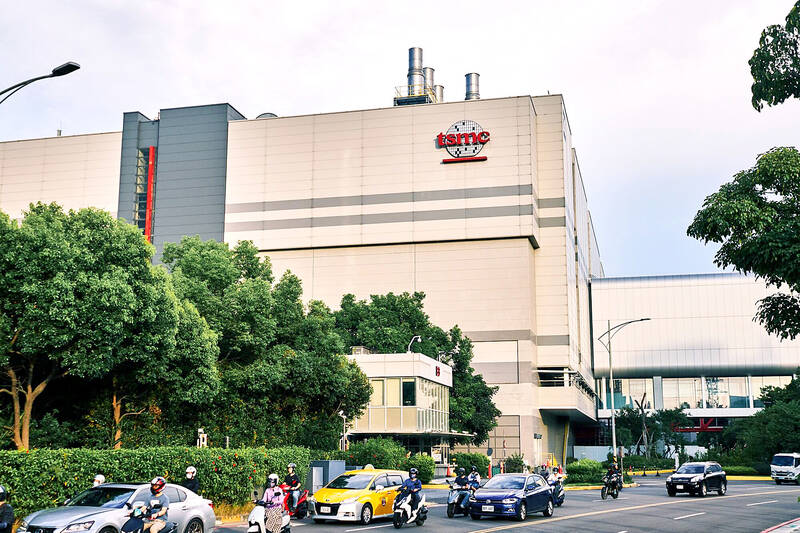Taiwan Semiconductor Manufacturing Co (TSMC, 台積電) yesterday obtained the government’s approval to inject an additional US$7.5 billion into its US subsidiary, the Department of Investment Review said in a statement.
The department approved TSMC’s application of investing in TSMC Arizona Corp, which is engaged in the manufacturing, sales, testing and design of IC and other semiconductor devices, it said.
The latest capital injection follows a US$5 billion investment for TSMC Arizona approved in June. The chipmaker has broken ground on two advanced fabs in Arizona with aggregated investments approved by the department totaling US$24 billion thus far.

Photo: An Rong Xu, Bloomberg
According to TSMC, the first Arizona fab is scheduled to start mass production using sophisticated 4-nanometer process technology in the first half of next year, while the second fab is to begin volume production using 3nm and 2nm process technology in 2028.
TSMC has also unveiled plans to build a third fab there using the 2nm process or more advanced technology with overall investments above US$65 billion in Arizona.
The chipmaker also in February launched a fab in Kumamoto, Japan and announced plans for a second, as part of an estimated US$20 billion investment. In Europe, it broke ground on a 12-inch wafer fab in Dresden, Germany, last month.
However, TSMC said earlier yesterday that it has no new concrete overseas expansion plans, following news reports that its top executives recently held talks in the United Arab Emirates (UAE).
While not addressing the UAE rumors directly, TSMC told CNA that it was always open to constructive discussions on promoting the development of the semiconductor industry, adding it remained focused on its current global projects.
On Sunday, the Wall Street Journal reported that top TSMC executives recently visited the UAE to discuss building a plant cluster similar in scale to the chipmaker’s largest and most advanced facilities in Taiwan.
According to the Journal, the UAE has also courted chipmaking investment from South Korea’s Samsung Electronics Co.
Under the initial discussions, the investment plans of TSMC and Samsung would be funded by the UAE with the aim of raising global chip production and capping soaring prices without hurting chipmakers’ bottom lines, the Journal said, citing a source familiar with the matter.
Commenting on the report, Ray Yang (楊瑞臨), an international strategy development consulting director at the government-sponsored Industrial Technology Research Institute (ITRI), said that he suspected speculation arose after TSMC sent its marketing personnel to the UAE.
“But, TSMC investing in the UAE is a thing which has not even begun to take shape,” Yang said.

TAKING STOCK: A Taiwanese cookware firm in Vietnam urged customers to assess inventory or place orders early so shipments can reach the US while tariffs are paused Taiwanese businesses in Vietnam are exploring alternatives after the White House imposed a 46 percent import duty on Vietnamese goods, following US President Donald Trump’s announcement of “reciprocal” tariffs on the US’ trading partners. Lo Shih-liang (羅世良), chairman of Brico Industry Co (裕茂工業), a Taiwanese company that manufactures cast iron cookware and stove components in Vietnam, said that more than 40 percent of his business was tied to the US market, describing the constant US policy shifts as an emotional roller coaster. “I work during the day and stay up all night watching the news. I’ve been following US news until 3am

Six years ago, LVMH’s billionaire CEO Bernard Arnault and US President Donald Trump cut the blue ribbon on a factory in rural Texas that would make designer handbags for Louis Vuitton, one of the world’s best-known luxury brands. However, since the high-profile opening, the factory has faced a host of problems limiting production, 11 former Louis Vuitton employees said. The site has consistently ranked among the worst-performing for Louis Vuitton globally, “significantly” underperforming other facilities, said three former Louis Vuitton workers and a senior industry source, who cited internal rankings shared with staff. The plant’s problems — which have not

TARIFF CONCERNS: The chipmaker cited global uncertainty from US tariffs and a weakening economic outlook, but said its Singapore expansion remains on track Vanguard International Semiconductor Corp (世界先進), a foundry service provider specializing in producing power management and display driver chips, yesterday withdrew its full-year revenue projection of moderate growth for this year, as escalating US tariff tensions raised uncertainty and concern about a potential economic recession. The Hsinchu-based chipmaker in February said revenues this year would grow mildly from last year based on improving supply chain inventory levels and market demand. At the time, it also anticipated gradual quarter revenue growth. However, the US’ sweeping tariff policy has upended the industry’s supply chains and weakened economic prospects for the world economy, it said. “Now

COLLABORATION: Given Taiwan’s key position in global supply chains, the US firm is discussing strategies with local partners and clients to deal with global uncertainties Advanced Micro Devices Inc (AMD) yesterday said it is meeting with local ecosystem partners, including Taiwan Semiconductor Manufacturing Co (TSMC, 台積電), to discuss strategies, including long-term manufacturing, to navigate uncertainties such as US tariffs, as Taiwan occupies an important position in global supply chains. AMD chief executive officer Lisa Su (蘇姿丰) told reporters that Taiwan is an important part of the chip designer’s ecosystem and she is discussing with partners and customers in Taiwan to forge strong collaborations on different areas during this critical period. AMD has just become the first artificial-intelligence (AI) server chip customer of TSMC to utilize its advanced